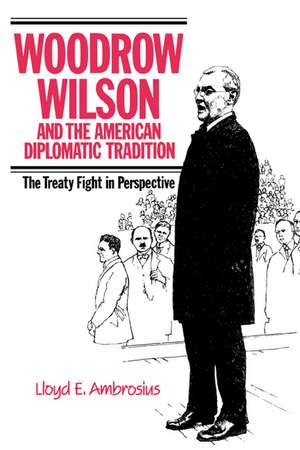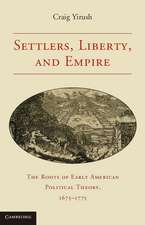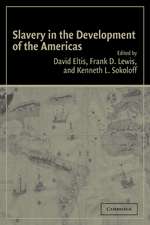Woodrow Wilson and the American Diplomatic Tradition: The Treaty Fight in Perspective
Autor Lloyd E. Ambrosiusen Limba Engleză Paperback – 25 ian 1990
Preț: 271.01 lei
Nou
Puncte Express: 407
Preț estimativ în valută:
51.86€ • 53.95$ • 42.82£
51.86€ • 53.95$ • 42.82£
Carte tipărită la comandă
Livrare economică 14-28 aprilie
Preluare comenzi: 021 569.72.76
Specificații
ISBN-13: 9780521385855
ISBN-10: 0521385857
Pagini: 344
Dimensiuni: 152 x 229 x 20 mm
Greutate: 0.48 kg
Ediția:Revised
Editura: Cambridge University Press
Colecția Cambridge University Press
Locul publicării:New York, United States
ISBN-10: 0521385857
Pagini: 344
Dimensiuni: 152 x 229 x 20 mm
Greutate: 0.48 kg
Ediția:Revised
Editura: Cambridge University Press
Colecția Cambridge University Press
Locul publicării:New York, United States
Cuprins
Preface; Acknowledgments; List of abbreviations; 1. Introduction: Wilson's new world; 2. Origins of Wilson's league of nations idea; 3. Drafting of the League of Nations Covenant; 4. American criticism of Wilson's peacemaking; 5. Revision of the League of Nations Covenant; 6. The question of control at home and abroad; 7. The Versailles Treaty in the Senate; 8. American rejection of the Versailles peace; 9. The aftermath of Wilson's peacemaking; 10. Epilogue: Wilson's legacy; Bibliography; Index.
Recenzii
'There has been a gap in the subject [of American involvement in the founding of the League of Nations] which Lloyd E. Ambrosius has now filled with his lucid and comprehensive narrative. On the basis of quite remarkably extensive research in private papers as well as published sources, Ambrosius traces the story of the League from Wilson's adoption of the ideal while America was still neutral through the Paris peace conference and the proceedings of the Senate to the election of 1920 which, as Ambrosius convincingly shows, represented the emphatic repudiation of Wilson and his League.' John A. Thompson, The Times Higher Education Supplement
'Lloyd E. Ambrosius offers an ambitious reinterpretation of the U.S. Senate's rejection of the Versailles treaty, the first of the 'great debates' over the role of the United States in world politics. Ambrosius is most successful in clarifying the day-to-day politics of the treaty fight, especially the manoeuvres of Lodge and his minions. This aspect guarantees the utility of Woodrow Wilson and the American Diplomatic Tradition to historians of Wilson and the First World War.' David F. Trask, International History Review
'Lloyd E. Ambrosius offers an ambitious reinterpretation of the U.S. Senate's rejection of the Versailles treaty, the first of the 'great debates' over the role of the United States in world politics. Ambrosius is most successful in clarifying the day-to-day politics of the treaty fight, especially the manoeuvres of Lodge and his minions. This aspect guarantees the utility of Woodrow Wilson and the American Diplomatic Tradition to historians of Wilson and the First World War.' David F. Trask, International History Review









